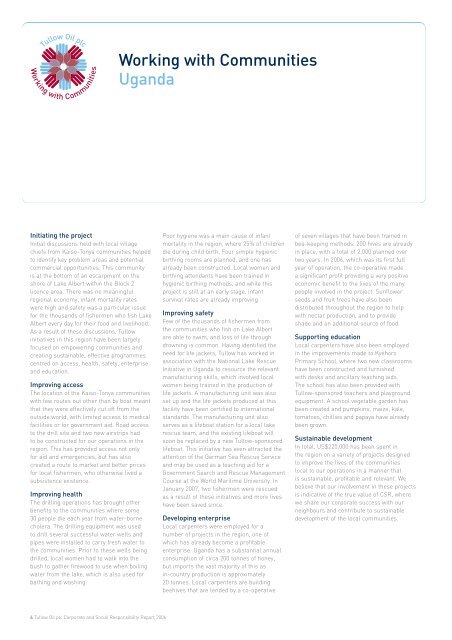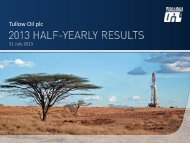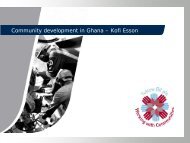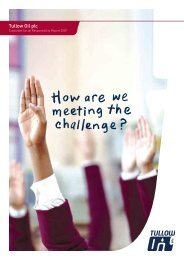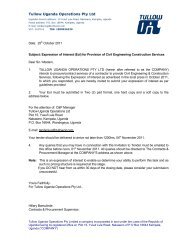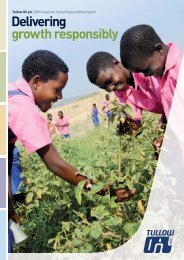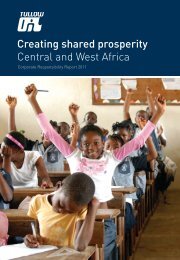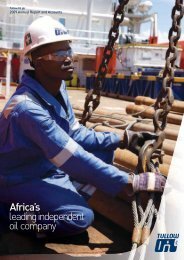Download the CR Report PDF (1.90MB) - Tullow Oil plc
Download the CR Report PDF (1.90MB) - Tullow Oil plc
Download the CR Report PDF (1.90MB) - Tullow Oil plc
You also want an ePaper? Increase the reach of your titles
YUMPU automatically turns print PDFs into web optimized ePapers that Google loves.
Working with Communities<br />
Uganda<br />
Initiating <strong>the</strong> project<br />
Initial discussions held with local village<br />
chiefs from Kaiso-Tonya communities helped<br />
to identify key problem areas and potential<br />
commercial opportunities. This community<br />
is at <strong>the</strong> bottom of an escarpment on <strong>the</strong><br />
shore of Lake Albert within <strong>the</strong> Block 2<br />
licence area. There was no meaningful<br />
regional economy, infant mortality rates<br />
were high and safety was a particular issue<br />
for <strong>the</strong> thousands of fishermen who fish Lake<br />
Albert every day for <strong>the</strong>ir food and livelihood.<br />
As a result of <strong>the</strong>se discussions, <strong>Tullow</strong><br />
initiatives in this region have been largely<br />
focused on empowering communities and<br />
creating sustainable, effective programmes<br />
centred on access, health, safety, enterprise<br />
and education.<br />
Improving access<br />
The location of <strong>the</strong> Kaiso-Tonya communities<br />
with few routes out o<strong>the</strong>r than by boat meant<br />
that <strong>the</strong>y were effectively cut off from <strong>the</strong><br />
outside world, with limited access to medical<br />
facilities or for government aid. Road access<br />
to <strong>the</strong> drill site and two new airstrips had<br />
to be constructed for our operations in <strong>the</strong><br />
region. This has provided access not only<br />
for aid and emergencies, but has also<br />
created a route to market and better prices<br />
for local fishermen, who o<strong>the</strong>rwise lived a<br />
subsistence existence.<br />
Improving health<br />
The drilling operations has brought o<strong>the</strong>r<br />
benefits to <strong>the</strong> communities where some<br />
30 people die each year from water-borne<br />
cholera. The drilling equipment was used<br />
to drill several successful water wells and<br />
pipes were installed to carry fresh water to<br />
<strong>the</strong> communities. Prior to <strong>the</strong>se wells being<br />
drilled, local women had to walk into <strong>the</strong><br />
bush to ga<strong>the</strong>r firewood to use when boiling<br />
water from <strong>the</strong> lake, which is also used for<br />
bathing and washing.<br />
Poor hygiene was a main cause of infant<br />
mortality in <strong>the</strong> region, where 25% of children<br />
die during child birth. Four simple hygienic<br />
birthing rooms are planned, and one has<br />
already been constructed. Local women and<br />
birthing attendants have been trained in<br />
hygienic birthing methods, and while this<br />
project is still at an early stage, infant<br />
survival rates are already improving.<br />
Improving safety<br />
Few of <strong>the</strong> thousands of fishermen from<br />
<strong>the</strong> communities who fish on Lake Albert<br />
are able to swim, and loss of life through<br />
drowning is common. Having identified <strong>the</strong><br />
need for life jackets, <strong>Tullow</strong> has worked in<br />
association with <strong>the</strong> National Lake Rescue<br />
Initiative in Uganda to resource <strong>the</strong> relevant<br />
manufacturing skills, which involved local<br />
women being trained in <strong>the</strong> production of<br />
life jackets. A manufacturing unit was also<br />
set up and <strong>the</strong> life jackets produced at this<br />
facility have been certified to international<br />
standards. The manufacturing unit also<br />
serves as a lifeboat station for a local lake<br />
rescue team, and <strong>the</strong> existing lifeboat will<br />
soon be replaced by a new <strong>Tullow</strong>-sponsored<br />
lifeboat. This initiative has even attracted <strong>the</strong><br />
attention of <strong>the</strong> German Sea Rescue Service<br />
and may be used as a teaching aid for a<br />
Government Search and Rescue Management<br />
Course at <strong>the</strong> World Maritime University. In<br />
January 2007, two fishermen were rescued<br />
as a result of <strong>the</strong>se initiatives and more lives<br />
have been saved since.<br />
Developing enterprise<br />
Local carpenters were employed for a<br />
number of projects in <strong>the</strong> region, one of<br />
which has already become a profitable<br />
enterprise. Uganda has a substantial annual<br />
consumption of circa 200 tonnes of honey,<br />
but imports <strong>the</strong> vast majority of this as<br />
in-country production is approximately<br />
20 tonnes. Local carpenters are building<br />
beehives that are tended by a co-operative<br />
of seven villages that have been trained in<br />
bee-keeping methods. 200 hives are already<br />
in place, with a total of 2,000 planned over<br />
two years. In 2006, which was its first full<br />
year of operation, <strong>the</strong> co-operative made<br />
a significant profit providing a very positive<br />
economic benefit to <strong>the</strong> lives of <strong>the</strong> many<br />
people involved in <strong>the</strong> project. Sunflower<br />
seeds and fruit trees have also been<br />
distributed throughout <strong>the</strong> region to help<br />
with nectar production, and to provide<br />
shade and an additional source of food.<br />
Supporting education<br />
Local carpenters have also been employed<br />
in <strong>the</strong> improvements made to Kyehoro<br />
Primary School, where two new classrooms<br />
have been constructed and furnished<br />
with desks and ancillary teaching aids.<br />
The school has also been provided with<br />
<strong>Tullow</strong>-sponsored teachers and playground<br />
equipment. A school vegetable garden has<br />
been created and pumpkins, maize, kale,<br />
tomatoes, chillies and papaya have already<br />
been grown.<br />
Sustainable development<br />
In total, US$220,000 has been spent in<br />
<strong>the</strong> region on a variety of projects designed<br />
to improve <strong>the</strong> lives of <strong>the</strong> communities<br />
local to our operations in a manner that<br />
is sustainable, profitable and relevant. We<br />
believe that our involvement in <strong>the</strong>se projects<br />
is indicative of <strong>the</strong> true value of CSR, where<br />
we share our corporate success with our<br />
neighbours and contribute to sustainable<br />
development of <strong>the</strong> local communities.<br />
4 <strong>Tullow</strong> <strong>Oil</strong> <strong>plc</strong> Corporate and Social Responsibility <strong>Report</strong> 2006


